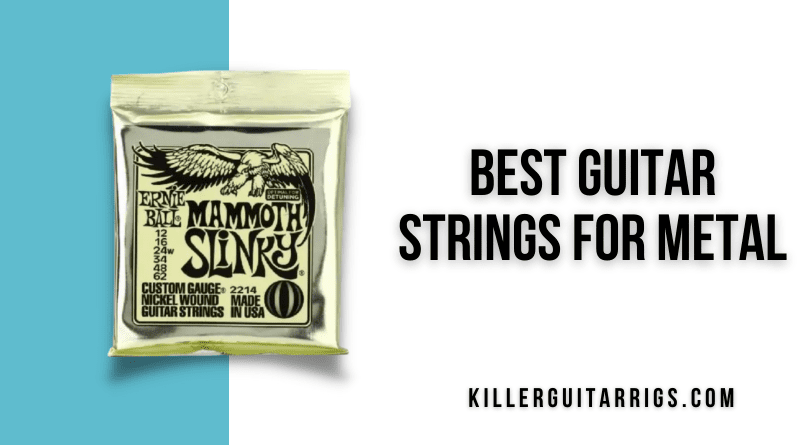Any guitarist looking to properly hone their sound really needs to consider all available opportunities to customize their axe to better suit their chosen niche. This is especially true with metal and the various subsets of the genre. The wrong guitar, pickups, or even the wrong strings can make your sound way too weak!
With that in mind, in this KillerGuitarRigs Guide, we looked at the best guitar strings for metal. To keep things consistent, each set was tested on a Jim Root Signature Telecaster, played through a Bugera V22 Infinium, with FX courtesy of a RAT distortion pedal.
During the test we focused on:
- Tuning Stability – How well did the strings stay in tune?
- String Strength – Did any strings suffer breakages during hard play?
- Overall Tone – Did the strings chug the way they need to for metal?
Read more about our review process.
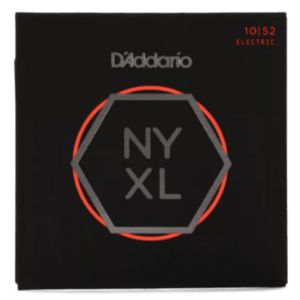
D'Addario NYXL1052 Light top/Heavy bottom
Features: Premium high carbon steel, Hex core shape, Heavy gauge bottom 3 strings
Benefits: Excellent drop tuning performance, Fantastic stability, Long lifespan
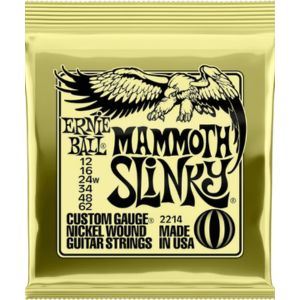
Ernie Ball 2214 Mammoth Slinky
Features: Tin plated hex steel core, Nickel plated steel wrap, Bronze ball end lock wire
Benefits: Designed for drop tuning, Great slippage resistance, Fast break in
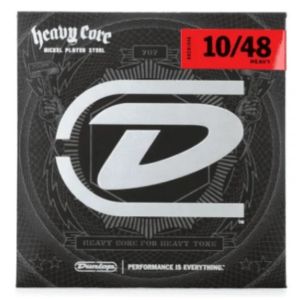
Dunlop DHCN1048 Heavy Core NPS
Features: Round wound, Nickel plated steel wrap, High strength steel core
Benefits: Developed for heavy genres, Great drop tuning stability, Smooth feel
Contents
Our Top 3
Our Top Pick for metal strings was the Ernie Ball Mammoth Slinky set. Ernie Ball claims they’re optimal for detuning, and they aren’t wrong. These are heavy strings that hold up well to thrash, yet retain enough feel to handle fast solos.
If you’re looking for a great set of strings without breaking the bank, our Best Value pick was the Dunlop Heavy Core NPS set. These strings are truly designed for metal players and use purpose-made cores and wrap wires to ensure that the lows and mids remain tight and focused – just where you want them to be!
Players looking for something high-end may want to consider our Editor’s Choice – the D’Addario NYXL (Light Top/Heavy Bottom) hybrid set. These strings are designed to take all kinds of abuse and still give you the feedback you need while playing complex solos.
Individual Reviews
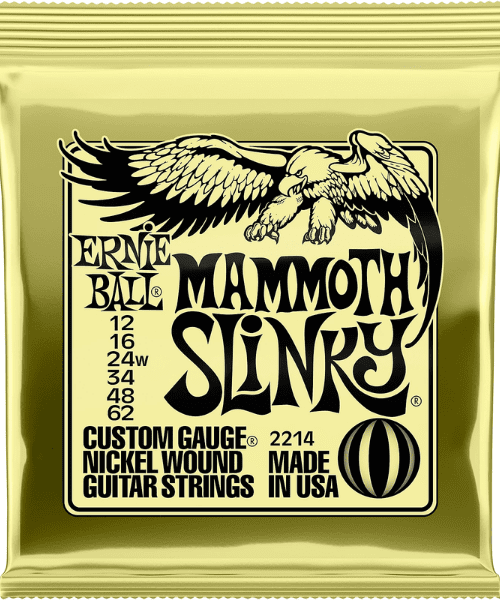
Ernie Ball Mammoth Slinky
A fantastic set of strings that can handle a number of different drop tunings.
These strings come with the famed consistency and reliability of Ernie Ball's Slinky series strings, but with the size and power to handle all genres of metal. They hold tension well across a range of alternate tunings, and because they're so popular, they're easily available almost evrywhere.
From the moment these strings were installed, they simply leaped out at us. The Mammoth Slinkies are the heaviest strings Ernie Ball has ever made! They’re a custom gauge set that go from .012 to .062. This gauge allowed them to retain tension even with drop tuning, which really kept the mids tight.
Tuning stability was rock solid. They really didn’t take long at all to settle and stretch, and once that was taken care of, they kept pitch beautifully. They were only tuned down to drop D, but the sheer girth of these strings will ensure you can tune to drop A, drop B, and even C standard.
They’re constructed around a tin-plated steel hex core. Hex cores do typically help with durability and in the case of the Mammoth Slinkies, this was absolutely true. There were no breakages, even with some fairly excessive strumming.
The strings are nickel coated, which resulted in an unexpectedly bright tone for such a heavy string. While bright isn’t exactly what most metal players are shooting for, the wound G string really helped to keep the brilliance in check. A wound G string does take a little getting used to, but it shouldn’t be an issue if you’re already comfortable with heavy-gauge strings.
Verdict: These strings were simply incredible! Ernie Ball Mammoth Slinky strings are a great choice for any style of metal. They can handle multiple drop tunings on pretty much any scale length, which is essential for this genre. The midrange focus was superb and the weight of these strings gave some serious sustain!
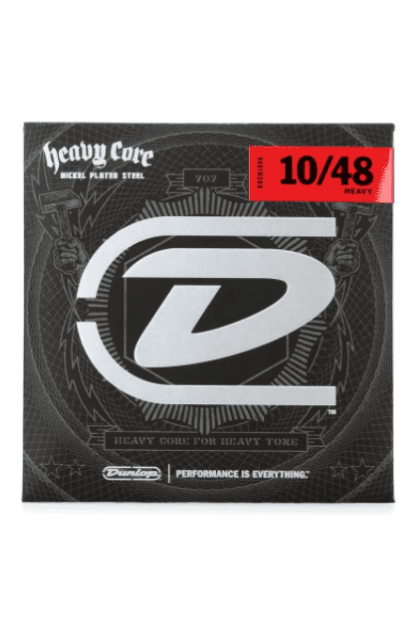
Dunlop Heavy Core NPS
Great value strings designed to take serious punishment.
This set of Dunlop strings were designed specifically for metal. They're made with a thicker core than any other dunlop string, allowing them to hold more tension and resist string buzz when drop tuned. They're punchy, and hold up brilliantly for rhythm guitar.
The Heavy Core NPS from Dunlop comes in 3 different gauges: Heavy at the thinner end, the middle is Heavier, and the thickest strings are referred to as Heaviest. In this test, we checked out the lightest of the 3, the Heavy gauge. This set runs from .010” to .048”.
The first thing that was noticed after opening these strings was the attention to detail, even in the packaging. An image of Thor’s hammer adorns the outer packet and a sealed-vapor corrosion-inhibitor bag prevents aging of the strings before the pack is opened.
Dunlop designed these strings with a thicker core than any of their other sets, enabling them to hold more tension. When striking these strings in drop D, you can literally see the side-to-side vibration, rather than the circular motion that often occurs when drop tuning with regular strings. This really helped to keep buzz to a minimum when playing hard.
These strings took a bit of time to settle, but once they’d stretched out, tuning stability wasn’t much of an issue.
As far as tones went, these nickel-plated steel strings were bright and well articulated when playing clean, with punchy mids at high distortion. Single-note articulation isn’t as fat as other strings, but they are still a rock-solid choice for rhythm players.
Verdict: If you’re looking for strings that feel like ultra-heavies, but don’t necessarily have the sound profile to match, Dunlop Heavy Core NPS could be a great choice. Their specially designed core makes them behave like much heavier strings when it comes to strength and durability, yet they sound appropriate for their actual gauge. This provides confidence to sharpen up attack without fear of snapping strings. Under any circumstances, they well outperform their price point.
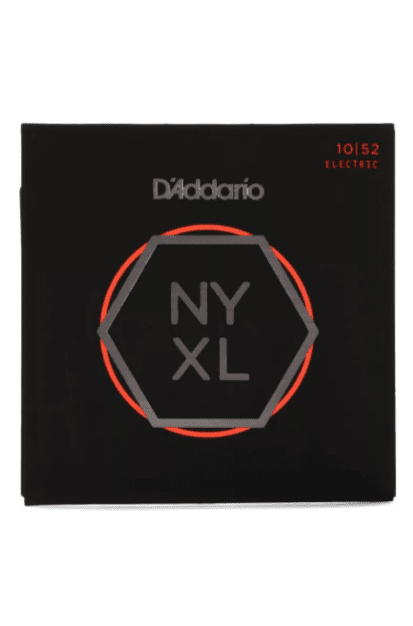
D'Addario NYXL Light/Heavy
Hybrid strings that seamlessly blend power and control.
NYXL Strings are renowned for their extreme longevity, exceptional tone, and fantastic stability, and with this hybrid gauge set, metal players can experience these benefits, too. They offer a heavy bottom end for reliable drop tuning, and a light top end for lightning fast solos and easy control over bends.
Hybrid strings are a great choice for styles like metal, and D’Addario got the blend just right in this NYXL set. The high end is light, coming in at just .010”, while the bottom is a heavy .052”. This really gave them the flexibility required to switch between hard strumming rhythm and intricate solo work. It was easy to get bends up to a full step on the treble side, something that’s just not possible with a full heavy set.
Tuning stability was good, despite the fact that unlike some of the other sets on test, they aren’t strictly designed with drop tuning in mind. They’re fantastic at standard tuning, in fact some of the very best, and they absolutely hold their own in alternative pitches.
One thing that stood out about this set was the coating. It was incredibly smooth, which made speed metal licks a breeze. These NYXL strings are not only fast, but they’re comfortable, too – something to bear in mind if you find that rough strings limit your playing.
Tonally, they were fantastic. They are nickel plated, which is fairly standard for electric strings, but D’Addario has adjusted the alloy to improve the magnetism, which has genuinely worked. The midrange output was insane – very crunchy, but still providing really nice note separation when necessary.
There were no string breaks during this short test, so it’s safe to say that they can stand up to rigorous metal guitar work and remain reliable.
Verdict: Overall, the D’Addario NYXL Light Top/Heavy Bottom strings were fantastic to play. They were the fastest strings on test (by a considerable margin), they were super comfortable and had phenomenal midrange presence. If you play hard all the time, you may want to look at heavier strings like the Mammoth Slinkies. But if you’re looking for something premium, especially if you’re playing Malmsteen-style with lightning-fast sweeps, these strings are unbeatable.
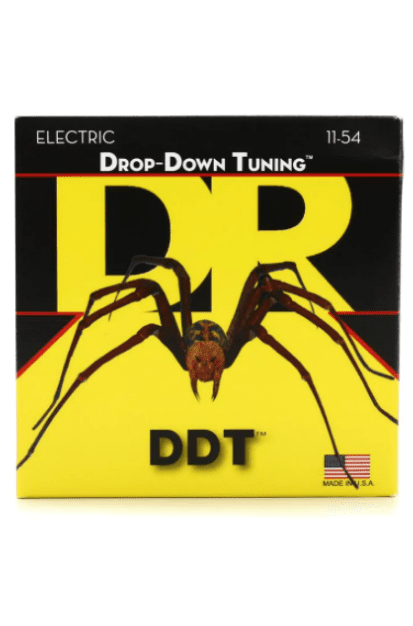
DR Strings DDT
Hand made strings specifically designed for drop tuning.
When the strings literally have "Drop Down Tuning" in the name, you know you're looking at a set that will be perfect for metal. They provide superb tuning stability right out of the packet, and their clarity even with high gain and distortion is excellent.
DR Strings are highly regarded for their premium, handmade strings, so it was great to try out their DDT, or “Drop Down Tuning” set. We looked at the extra heavy gauge for this test, which runs from .011” to .054”. They felt pre-stretched and blew us away with their rock-solid stability from the second they were tuned to pitch. This is great news for gigging players who may need to change strings on the fly.
As with anything handmade, inconsistency is often an unfortunate tradeoff for craftsmanship. It was disappointing to find the B string had begun pitting in the packaging. A brief look around the internet suggests this isn’t entirely uncommon with these strings. It wasn’t so severe that it truly affected tone, but it definitely has the potential to affect lifespan.
As far as comfort and speed were concerned, the gritty feeling (presumably caused by the pitting) had a marginal effect, although with a few more hours of use they would likely smooth out, improving the situation. These strings are super stiff, which you’ll either love or hate. They offer excellent control for fast strumming,
Where they really shine, though, is their tone. They sounded incredible at drop D! They were amazing both clean and distorted, and there was no observed muddiness. The range of string sizes from high E to low E is just right, so finger pressure could be consistently applied. This made both barre chords and fast solos alike sound superb.
Verdict: This DR Strings DDT set was, as promised, well suited to drop tuning. We loved the tuning stability and practically non-existent break-in period. If you absolutely need comfort above all else in your strings, this isn’t the set for you. But if you’re willing to forego feel for great tone when playing super heavy, you may just love these strings.
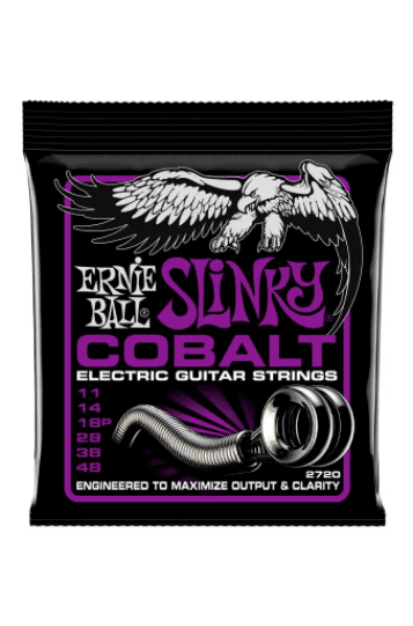
Ernie Ball Power Slinky Cobalt
A revolutionary string set using ultra modern alloys to produce high output tones.
The use of cobalt in these strings results in an incredible feel, with coated string lifespan, and fat tones that work great for metal. They have huge bottom end presence and retain clarity throughout the volume range.
Ernie Ball’s Power Slinky Cobalt strings are one of their newest innovations and they’ve been on the KGR “must try” list ever since we heard about them. As you can see from the name, they use cobalt in the alloy, which is a pretty exotic material when it comes to guitar strings. The result was probably the smoothest feeling non-coated string we’ve ever tested.
The smooth finish also made strumming with a heavy attack super fast. There was no hang up, which will let you keep tempo right where it needs to be for extended periods. Besides the cobalt finish, these were unlike any other set of Power Slinky strings, with gauges ranging from .011” to .048”.
Tuning stability was decent. Like the other strings that aren’t specifically designed for drop tuning, tension was a little low, which prevented an easy stretch/break-in period, but they did eventually settle and kept pitch nicely after that.
As far as lifespan goes, these strings were impressive. After more than a week of heavy use, there weren’t even the first signs of deadening. Tones remained clear, with massive lows, a pronounced midrange and seemingly endless sustain. The cobalt alloy is designed to improve magnetism, which will definitely be of use to players using guitars without active pickups.
The biggest downside was the price. They were enjoyable to play and they sounded great, but at almost double the cost of our best overall title winners, the Mammoth Slinkies, it’s not overly apparent that the tonal and feel benefits of the Cobalt Slinkies offered the right value for money.
Verdict: Players who dislike coated strings but still want a smooth, fast-playing experience will probably love Ernie Ball Power Slinky Cobalt strings. They sounded great with distortion and the super smooth feel translated to incredible speed. They do take longer than average to settle into drop tunings, but then again, they aren’t purpose built for alternative tuning.
How to Choose The Right Strings For You
When it comes to choosing the best strings for metal these are the factors you should be taking into consideration:
Gauge
The gauge of guitar strings and the tension they can hold have a direct correlation. Many styles of metal often call for alternative tunings, usually at pitches below standard. When tuning a guitar lower, the strings are inherently looser.
A guitar string that plays well under these conditions typically has a heavier gauge. Heavy gauge strings are stiffer than their lighter counterparts, allowing them to retain tension even in drop tunings. This keeps them from buzzing, and allows them to retain clarity.
Not only are heavier gauge strings better able to retain tension in drop tunings, they are also much harder-wearing. Metal being a fairly aggressive genre, it requires fast and heavy playing. Light gauge strings are certainly more comfortable and tactile, but they are significantly more prone to breakage under these playing conditions.
Players looking for a combination of durability and feel can benefit from hybrid strings. Hybrid strings are pre-assembled packs that feature light to medium top-end strings with heavy bottom strings. The result is a set that can handle sharper attack and heavy strumming for rhythm playing, but that still retain pliability and feel for solos and lead work on the treble strings. Check out our guide to hybrid strings here for more indepth information.

Alloy
An alloy is a mixture of metals that’s been blended to achieve certain properties. Guitar string manufacturers often experiment with different alloy ratios to customize various elements of their strings, including lifespan, tone, and comfort.
The typical go-to when it comes to the best strings for metal is nickel-wound steel. This involves having a steel core, with nickel wrap wire on the bass-side strings.
Nickel is a great choice for metal because of the well-rounded sound profile. They offer a nice balance between beefy lows and punchy mids, while keeping excessively harsh brightness under control.
Don’t confuse nickel with nickel-plated, though. Nickel-plated string wraps use other metals, and by process of electrolysis, coat them with a thin layer of nickel. They initially offer a similar tonal profile to pure nickel, but the coating wears away with use, leading to inconsistent sound and dead strings.
Some manufacturers like Ernie Ball have had success using experimental alloys like cobalt in their strings. Cobalt offers even more clarity than nickel, which prevents muddiness. They also tend to last longer and feel extremely smooth, giving many of the benefits of a coated string, without the drawbacks of polymer coating.
There are downsides, of course, the biggest of which is the cost. Cobalt being a rarer element, is more expensive to mine and process, which translates to a pricier product. Availability is another drawback. As these are specialist strings, independent local stores may not carry them, which can be problematic if you need a set in a hurry and have no access to a big box store.
Coating
Coated strings absolutely have their place in the metal genres. Polymer coating helps to improve string longevity in several ways, which can allow for more aggressive playing. First, as the coating slows down the corrosion process, strings are less likely to break unexpectedly due to premature aging. Secondly, the coating allows picks to better glide over the surface of the strings. This has a lubricating effect, which reduces wear and your odds of breaking strings due to heavy strumming.
Coated strings also allow for faster repositioning around the fretboard. Metal is typically played at fast tempos, so any help you can get to improve the pace of transitions is usually welcomed.
Of course, not everyone likes the slick feeling of coated strings. The tradeoff for the speed on the fingerboard can often be misplaced fingers caused by simply overshooting the mark. String coating often has a profound effect on tone, too. Modern coatings are getting much thinner and less noticeable, but if you demand maximum clarity and bell-like tones, you’re better off with uncoated strings.
Final Thoughts
While we’d happily recommend any of the strings that made the cut into this guide, our number one choice, the Mammoth Slinkies, were simply outstanding and deserve your attention. They were brilliant all around and difficult to find fault with.
If you’re understandably trying to stick to a budget, you really can’t go wrong with the Dunlop Heavy Cores. There were some downsides, but the low price still makes them an attractive proposition.
If money is no object and you’re looking for something more premium, be sure to check out the D’Addario NYXLs. Players who play fast and like coated strings will love this set!
By the way, while you’re here, be sure and check out our guide to the best metal guitars, our choices for the best speakers for metal, and our favorite guitars for doom metal.

